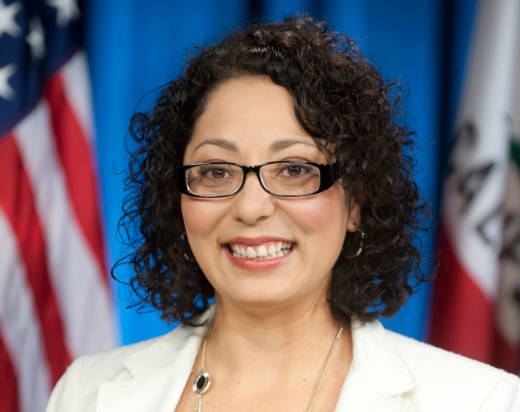MH Day Interview: CA Assemblymember Cristina Garcia

This February, California Assemblymember Cristina Garcia made state legislative history when she introduced the Menstrual Equity for All Act of 2021 (AB 367). If passed, this groundbreaking piece of legislation would ensure free access to menstrual products in all CA public schools, community colleges and colleges – a huge step in fighting period poverty for menstruating students.
During her tenure, the self-proclaimed Period Princess has been a staunch champion of menstrual equity, accessibility and justice. We were thrilled to talk to her about these achievements in a special MH Day interview! Tune in below as Rep. Garcia dives into her wins and challenges as a menstrual health legislator, the role of male allyship in passing menstruator-friendly policies, how to turn men and boys into allies (hint: communication is key!) and the importance of period product choice.
Jessica Williams
Last month you introduced Assembly Bill 367: the Menstrual Equity For All Act of 2021. This bill requires that state universities and community college campuses in California, grades 6-12 public schools and state/local municipal buildings provide free menstrual products. Can you give us an update on that bill and where it currently stands?
Rep. Cristina Garcia
Yeah, the bill left appropriations last week, and it's on the assembly floor. And I think on Thursday it'll be eligible for me to take it out and send it to the Senate. It's about halfway through the process for this year. When we introduced the bill it included all publicly-owned buildings, so it included things like state capitals, any government buildings, parks…and it's been narrowed down to just educational settings now, which was still great. But I would like to see menstrual products in all bathrooms everywhere. Just like we see toilet paper.
Jessica Williams
Absolutely, us too. We agree. So in 2017, you actually had legislation signed into law and that bill brought free menstrual products to low income schools and underserved communities. And later, you even helped repeal the tax charged on menstrual health products. As a result of all of this work in menstrual equity, you've proclaimed yourself the Period Princess, which I just love! And so I want to know, why is menstrual equity an important issue for you?
Rep. Cristina Garcia
I introduced my first bill, AB 1531 or 1661 [six years ago]. When I did the first one to get rid of the tax, I was just angry that I was being taxed for my biology. I'd always been angry. I wanted to do the bill when I first got here nine years ago, and my team was like, hold up, people are gonna make fun of you – like they don't know you yet. And so after a couple years of being here, I was like, I don't care anymore. Like I have a pedestal, I'm gonna use it for things that I want. And so I introduced my first bill…and that discussion became bigger than I could have ever imagined. And, you know, it's been amazing. It's been a discussion with a lot of people, but it's been mostly young people. And so it's been amazing to see their passion and their ability to share stories and educate us along the way. And so for me, it's not just about increasing access, but it's how we talk about our biology, how we stigmatize things, and for half of the population who menstruate – oftentimes, it's women, but it's not just women who menstruate out there. And how something that's so natural and should be celebrated, because it also means that this is how we reproduce, we've allowed to become something so negative, and something that seems dirty in so many places. To me, it's just crazy. And so it's evolved along the way, in large part from conversations, you know, with young individuals out there that I've had the luxury to have.
Jessica Williams
Well we're really grateful for all of your hard work in this. So as you know, Menstrual Hygeine Day is Friday, but we're celebrating all week at Days for Girls, and we are focusing our campaign this week on male allyship. And we were wondering how you think male allyship plays a key role in advancing menstrual equity?
Rep. Cristina Garcia
Well, I'll start with just in the legislature. We people who menstruate are less than 35% of the legislators who legislate on experience. And so for a lot of men in the legislature, they don't menstruate – a lot of the women or individuals that menstruate in their lives, don't talk about it, hide it from them – and so they're not thinking about it, but they hold a lot of power out there. And so they do need to be our allies, they need to let us lead that discussion. And they need to engage in that discussion. But then they need to use their power and harness their power to ensure that our desires and our needs, you know, are being addressed. And legislation continues to move forward. And so I always tell folks, how can you use your soapbox to elevate the issue? And they have a large soapbox, they have a lot of power in our world. And so how do they elevate that and elevate it in a way where instead of themselves speaking up, they take their soapbox, and give that space to someone who shares an experience related to this topic – or any topic for that matter?
Jessica Williams
So do you have any advice for women who are seeking the support of male allies in their menstrual health policy and advocacy efforts?
Rep. Cristina Garcia
I think just talk to them about it, right? Most of us with our male allies, they either have sisters, wives, daughters, grandmothers, and so I think it's reminding them about those menstruators in their lives, and asking them if they've thought about it, or sharing our own personal stories. I think that goes a really long way. I think there's some initial uncomfortableness. But I think when you start talking about it, and what it means to you or the lengths you've gone to when you don't have access to a product or your biology suddenly surprises you…what that means in what you had to do or what you had to stop doing in order to deal with that. I think it goes a long way. And so, you know, I think that there's power in our stories. There's power in sharing that out there. And there's power, I think, in that we also bring down the barriers with each of those conversations out there. And so I would just encourage individuals to have a discussion with with with the males in their lives. And I think most of them, when they're talking to you will become your allies. I think they might start off maybe by being uncomfortable, making jokes about it. But I think when you humanize a discussion, and it's someone that they trust, that they love, it's the best way to bring down those barriers.
Jessica Williams
Love it. And my final question is: I know you're bringing Bill 367 to the floor, hopefully this week. But what else is next for you as you advocate for women's rights and equality in California?
Rep. Cristina Garcia
So in the menstrual equity space, you know, I think we're gonna keep working to try to ensure that these products are available in all bathrooms, just like toilet paper. I think we also need to be talking about the fact that there's different types of products and picking the product that's best for you. I started by calling myself the tampon queen. And it came because when I first started in the space, I got called lots of nasty things and lots of jokes at my expense. But then I said, you know, I'm just gonna have fun with this. And so I'm going to call myself the Tampon Queen. Who doesn't want to be a queen of something? And in my discussions with young women – it was a young woman in particular who was like, you know, there's all these products, and you make one sound like that's the superior product, and it might be for you but not for everyone. And so I changed my title to Period Princess and I took the opportunity to talk about the fact that there's cups out there, there's sponges, there's underwear, there's reusable pads. Like you know, you have a variety things so pick the product that's best for you. But I think it's also like, how do we start having a discussion about making sure that we are picking items that are also going to be good for our environment? And so reusable stuff. Or I always talk to folks about, to think about the plastic in our applicators, for a lot of these tampons. And what that does to the environment and how sustainable that is.
And so I hope we could elevate that discussion along the way. I do a lot of a lot of work in the sphere of elevating woman. I'm the Chair of the California Legislative Women's Caucus, again this year. And so I do a lot of work around this equity, but also a lot of work around consent, a lot of work for our leadership by electing more women or having more women on boards out there. And so I'm going to continue to use my soapbox in the space to do that and along the way, elevate and put the spotlight on women who are breaking numbers and being leaders and role models and making sure that we're inclusive of that representation.
Jessica Williams
Fantastic. Well, on behalf of Days for Girls International, we thank you for all of your hard work we're watching and cheering you on.









